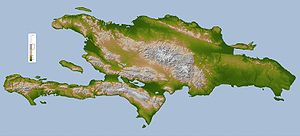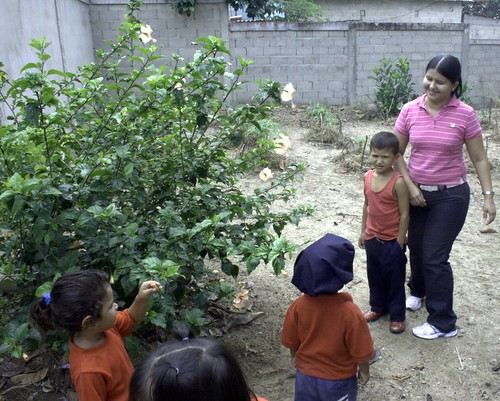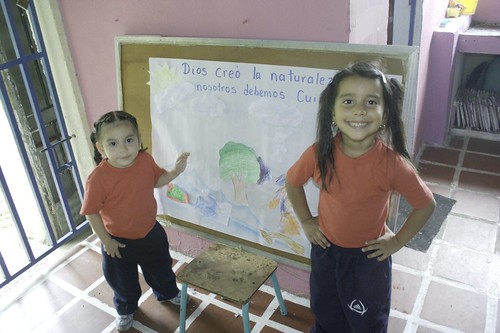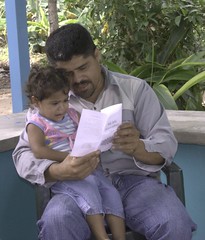In that light, a shortage of toilet
paper may not seem like that big a deal. In fact, we regularly buy
supplies in bulk, so we have not been hard hit by this problem as
yet. Nor am I trying to be flippant about it; rather, I am reminding
myself that the Lord was with the Apostle Paul through much worse.
For Venezuelans in general, however,
the situation is more serious than it might sound. For a number of
years, Venezuelans have had to deal not only with 30 percent
inflation, but also flat-out shortages of basic foodstuffs like
flour, margarine, cooking oil, sugar, eggs and milk. We have seen for
ourselves the empty supermarket shelves, but at least we can afford
to shop in supermarkets. The very poor perhaps can obtain these items
through government welfare programs, but that means being willing and
able to get up and present yourself at the designated distribution
center at 3 or 4 a.m. That's no joke if you are a single parent with
small children.
Recently the shortages have broadened
to include personal
hygiene supplies such as toiler paper, soap and toothpaste. At
the same time, sanitary measures have become more important than ever
with a renewed outbreak of H1N1
influenza in Venezuela. Seventeen people have died and
approximately 250 more have been infected, Reuters reported this
week.
Also known as “swine flu”, the 2009
pandemic, which began in the state of Veracruz, Mexico, and soon
spread throughout Mexico, North America, and parts of South America,
was one of the worst flu outbreaks in history. It ultimately killed
18,500 people, according to the World Health Organization (WHO). The
last outbreak in Venezuela was in 2011, with about 100 cases
reported. Preventative measures to stop the spread of the disease
include frequent washing of hands with warm, thoroughly cleaning
surfaces that many people might touch, and using tissue paper to
cover the mouth and nose while sneezing.
Ir certainly is heartwarming to hear
how Christians in the United States and around the world respond to
natural disasters like tornadoes, hurricanes, earthquakes, or
large-scale crop failures with donations to help those affected. One
might wish, however, that more people would understand that in many
parts of the world, poverty, homelessness, malnutrition and disease
are chronic, long-term problems that have become so commonplace that
they do not generate international headlines. Often people are in
need not because of some inexplicable “act of God”, but rather
because of the predictable consequences of human folly, perhaps their
own. That, however, does not negate the biblical mandate to share the
material blessings with which we have been blessed with those less
fortunate (Proverbs 25:21; Isaiah 58:6-7, 10; Matthew 25:35-36).
Here in La Caramuca, people not only
bear the brunt of national and international events, but also are
trapped in a cycle of poverty and despair because of family
instability, marital infidelity, domestic violence, drug and alcohol
abuse and false beliefs that do not satisfy their spiritual hunger.
The first priority of our mission is to bring them the good news of
Jesus Christ, that in Him one might have a right relationship with
God who loves us all and does not desire that anyone be locked in
misery and despair.
We also try to demonstrate that one may
trust God to provide all things by sharing what we have been given.
On our property we have many fruit trees that Luz Maria planted
herself back in the 1990s. These produce more than we can consume
ourselves: oranges, bananas, avocados, mangos and grapefruit. We also
have planted squash and cassava, a tuber similar to the potato which
thrives in tropical regions. The abundance of these plants we share
with the surrounding community.
Our preschool is supposed to provide
two nutritionally balanced meals per day for the children with funds
provided by a state program. However, the number of children has
grown faster than the program's annual budget, so most months the
funds run short. Luz Maria and I have made up the difference. We have
worked with others in collecting and distributing clothing and other
supplies for needy families.
We have been able to do these things by
God's grace and with donations from individual and congregations in
the United States. We are grateful to those who have enabled us to do
the Lord's work and we pray that more might understand the necessity
as Venezuela face political and economic difficulties.
 |
| One of our orange trees. |










![Reblog this post [with Zemanta]](http://img.zemanta.com/reblog_e.png?x-id=5b8ab380-d443-4eb9-ba37-3a541d01f38e)